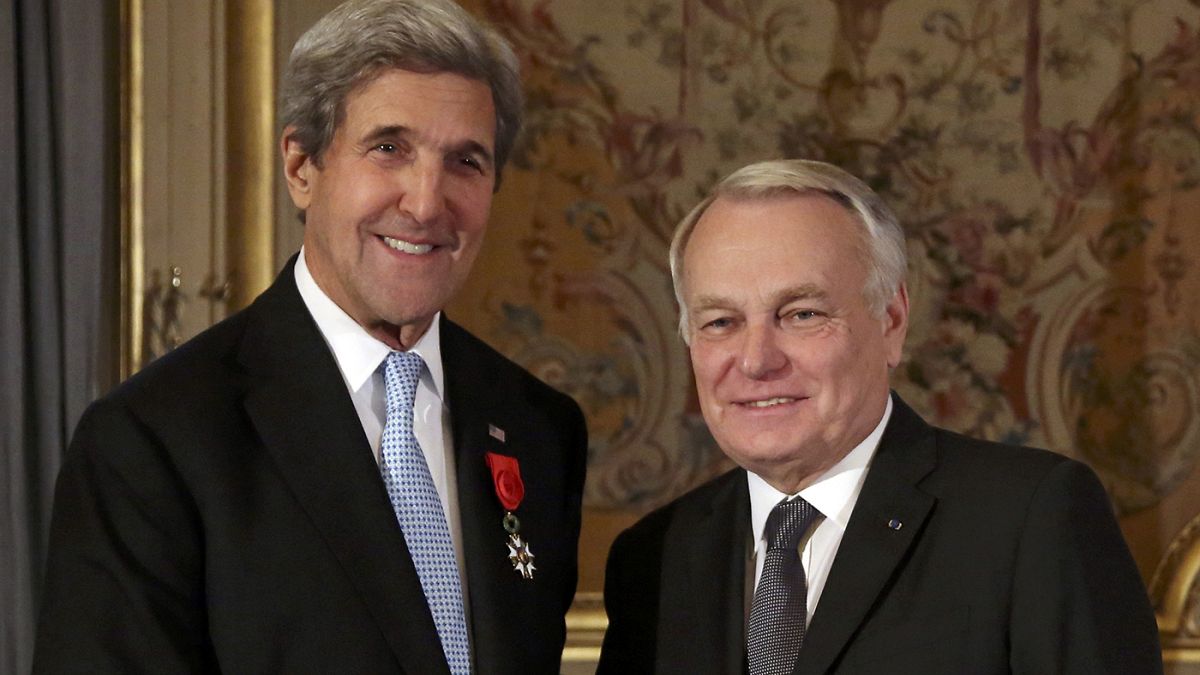Foreign ministers from the US, UK, Germany, Italy, Turkey, Saudi Arabia, UAE, Qatar and Jordan have met in Paris to discuss the situation in Aleppo as Russian diplomats and stakeholders gather in Swit
- High-level meetings in Paris, Geneva
- Little optimism about eastern Aleppo
- Russia and Syria should “show a little grace” – John Kerry
Foreign ministers from the US, UK, Germany, Italy, Turkey, Saudi Arabia, UAE, Qatar and Jordan have met in Paris to discuss the situation in Aleppo.
They were joined by Riad Hijab, a main Syrian opposition figure.
US Secretary of State John Kerry had talks with French Foreign Minister Jean-Marc Ayrault and German Foreign Minister Frank-Walter Steinmeier, among others.
Important meeting in Paris today to discuss #Syria & siege of Aleppo. pic.twitter.com/KSrcofZrqI
— John Kerry (@JohnKerry) 10 décembre 2016
US and Russian military experts and diplomats are also meeting in Geneva to discuss the situation in the east of the Syrian city.
Russia, US will discuss militants' pullout from #Aleppo during #Geneva meeting on December 10 – #Lavrovhttps://t.co/o1aaquYiYl#Syriapic.twitter.com/GHHlzQMJAW
— Sputnik (@SputnikInt) 8 décembre 2016
What did they say?
Judging by their comments to the press, ministers seem resigned to the fall of eastern Aleppo.
“The battle for Aleppo is not aiming to defeat terrorism but to try to eradicate all political opposition, and they aim above all to use violence to shore up a dictator who is scorned,” France’s Jean-Marc Ayrault told reporters.
“The goal is to liquidate the opposition, much more than to fight the Al-Nusra Front, like we are,” Ayrault added.
“We haven’t abandoned Aleppo,” said German Foreign Minister Frank-Walter Steinmeier, “and we haven’t given up and we’re going to do whatever we can to find solutions.”
“Russia and Assad have a moment here where they are obviously in a dominant position,” the US Secretary of State John Kerry told the press briefing.
“They have an ability to able to show a little bit of grace. And sometimes in diplomacy a little grace goes a long way.”
What France says
Beyond the issue of humanitarian access, France’s
Foreign Minister Jean-Marc Ayrault said Moscow and Damascus need to realise that the fall of Aleppo would not end the war.
Negotiations based on UN Security Council resolutions agreed in December 2015 should be revived to find a political solution, he added.
In a series of tweets, Ayrault explained the challenges the diplomats face.
La première urgence à Alep et dans toute la Syrie est l'arrêt des combats, l'arrêt des bombardements et l'accès de l'aide humanitaire
— Jean-Marc Ayrault (@jeanmarcayrault) 10 décembre 2016
“The first thing we must do in Aleppo and across all of Syria is stop the fighting, the bombardments and allow access for humanitarian aid,” Ayrault said.
La deuxième urgence est de définir les conditions d’une vraie transition politique, apte à garantir l’avenir d’une Syrie en paix
— Jean-Marc Ayrault (@jeanmarcayrault) 10 décembre 2016
Defining the conditions of genuine political transition, capable of guaranteeing a peaceful future for Syria is the second step, he added.
La troisième urgence, c’est de poursuivre la lutte contre le terrorisme, à commencer par la lutte contre Daech
— Jean-Marc Ayrault (@jeanmarcayrault) 10 décembre 2016
Continuing the fight against terrorism, primarily the combat against ISIL is the third step, Ayrault continued.
Enfin, il faudra reconstruire la Syrie. Sans transition politique, cette reconstruction sera impossible.
— Jean-Marc Ayrault (@jeanmarcayrault) 10 décembre 2016
Finally, we must rebuild Syria. This reconstruction will be impossible without an adequate political transition, Ayrault finished.
#Syrie – Les enjeux de la réunion de ce matin à Paris ► https://t.co/FVIJBmyxMdpic.twitter.com/CCi4xQCEXZ
— Jean-Marc Ayrault (@jeanmarcayrault) 10 décembre 2016
“What peace do they want? The peace of cemeteries?”, Ayrault asked. “Negotiations must start again, the opposition is ready to negotiate without preconditions.”
The context
Syrian government and allied forces have, in the last two weeks, driven rebels from most of their territory in what was once Syria’s most populous city.
Critics of the operation have warned that thousands of civilians risk being caught in the crossfire and have repeatedly called on Syrian government forces, backed by Russian air power, to accept a ceasefire to allow civilians and rebel fighters to leave for safer areas.
The rebels have controlled the eastern section since 2012.
President Assad’s Interview with Syria’s al-Watan https://t.co/Ht7pGAwO3Dpic.twitter.com/6ApioEKZ55
— LIBYA 360° (@libya360) 8 décembre 2016
President Bashar al-Assad said in an interview published on Thursday that retaking Aleppo would change the course of the civil war across the whole country.
Commentators say the Syrian government now appears closer to victory than at any point in the five years since protests against Assad evolved into an armed rebellion.
Do all the developments concern Aleppo?
No.
Outside of the city, the Syrian army declared a ceasefire in several areas around Damascus and the northwestern province of Idlib, beginning on Friday evening and without saying how long it would last.
There was no immediate comment from the rebels.
The war has killed more than 300,000 people and made more than half of Syrians homeless.
